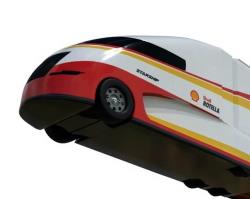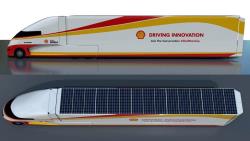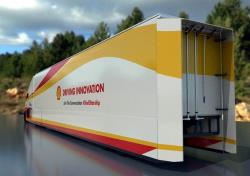The AirFlow Starship Aims To Break All Records For Class 8 Truck Fuel Efficiency
- Dec 22, 2017
But what’s the actual effect if one were to take an integrated approach to optimize all areas of the tractor-trailer that the wind passes over? That’s what Bob Sliwa has been pondering since he founded AirFlow Truck Company in 1983. After a misspent youth drag racing a 1965 GTO and then a 1966 L88 Chevelle SS he decided to start a trucking company, first as an owner-operator. Fast forward to 2009 when AirFlow developed its first hyper-efficient Class 8 rig. Equipped with a K&N air filter and nicknamed the BulletTruck, its nose looked like a cross between a Shinkansen and an NHRA Pro Stocker.
For example, the drag-inducing space between cab and trailer is closed by an electronically-controlled gap sealer. The system monitors the position of the truck in relation to the trailer retracting the sealer so that tight turning maneuvers don’t damage the gap sealer but then moves it back into place at highway speeds. The underside of both the truck and trailer is completely flat, which eliminates a great deal of turbulence-induced parasitic drag that the engine must overcome, especially at highway speeds. This both increases fuel consumption but also limits the revenue-generating load the truck can carry.
On the roof of the trailer is a 5000 watt solar array, while there’s a regenerative braking system on the trailer’s rear axle that collects otherwise lost energy on downhill runs. Power can be stored in a battery system like a Tesla, then used to drive the electrical systems of the truck (eliminating the drag of an alternator, thus achieving yet another improvement in engine efficiency). The engine is an X15 high-efficiency diesel from Cummins, offering the highest fuel economy in the industry. Because of the aerodynamic efficiency of the Starship, it doesn’t need to push its engine as hard as conventional trucks. So instead of running at the advertised governed speed of 1800/2000 rpm, the StarShip will redline at 1100 rpm, contributing to significant fuel savings. The engine is fitted with a unique Eaton transmission modified specifically for the Starship. Those fuel savings actually relate to the weight capacity of the truck as well. Instead of the standard 250-gallon fuel capacity, the Starship will be fitted with a 100-gallon fuel tank. At seven pounds per gallon for diesel fuel, that’s a weight savings of over a half a ton that can instead be used to carry revenue-generating cargo.
Improvements in aerodynamics on the truck have netted a 50% reduction in drag versus current trailer-trailer combinations. But there are other areas, particularly those affected by friction, that are addressed on the Starship as well, including low viscosity synthetic lubricants, low rolling resistance tires whose inflation pressures are constantly monitored and maximized for economic operation and long wear. If you’re going to be attending the Mid-America Trucking Show in Louisville, Kentucky, from March 22 through March 24, be certain to stop by the Shell booth and take a first-hand look at the future of trucking as exemplified by the AirFlow Starship. |














